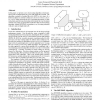Free Online Productivity Tools
i2Speak
i2Symbol
i2OCR
iTex2Img
iWeb2Print
iWeb2Shot
i2Type
iPdf2Split
iPdf2Merge
i2Bopomofo
i2Arabic
i2Style
i2Image
i2PDF
iLatex2Rtf
Sci2ools
102
click to vote
ISCAS
1995
IEEE
1995
IEEE
Minimum-Cost Bounded-Skew Clock Routing
In this paper, we present a new clock routing algorithm which minimizes total wirelength under any given path-length skew bound. The algorithm constructs a bounded-skew tree (BST) in two steps: (i) a bottom-up phase to construct a binary tree of shortest-distance feasible regions which represent the loci of possible placements of clock entry points, and (ii) a top-down phase to determine the exact locations of clock entry points. Experimental results show that our clock routing algorithm, named BST/DME, can produce a set of routing solutions with skew and wirelength trade-off.
| Added | 26 Aug 2010 |
| Updated | 26 Aug 2010 |
| Type | Conference |
| Year | 1995 |
| Where | ISCAS |
| Authors | Jason Cong, Cheng-Kok Koh |
Comments (0)

